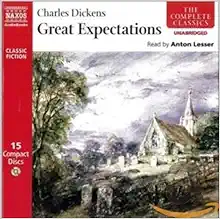
Description
Maybe you should listen to this first to understand the impact it had on Mister Pip's pupils. Too bad they didn't hear Anton Lesser's version, though chances are if they had, it would have affected them even more powerfully. Lesser reads so many audiobooks - I've just finished his beautiful if soporific rendering of Rumi's Spiritual Verses - that you forget what a huge range his acting skills cover. This is the perfect vehicle for his array of voices, accents and characters...I'm bound to admit that Lesser makes him not only sympathetic but even likable. - --Sue Arnold, The GuardianAs if you could forget, this Tuesday, 7 February, is Dickens's 200th birthday. I love the inimitable, but this birthday can't come soon enough. Leave aside the BBC launching 'a raft of DVD releases and fantastic downloads' of Edwin Drood, Our Mutual Friend and David Copperfield , and John Sutherland's The Dickens Dictionary: An A Z of England's Greatest Novelist (Icon) , there's still the resistible offer of 'an expert quote' from Dr Andrew Mangham from the English department of Reading University who tells us that his 'characters and idioms will live as long as the author's books remain in print.' No, really? For my money, the outright winner of this Dickens fest is the 19-hour Naxos AudioBooks recording of Great Expectations by Anton Lesser. Unabridged, beautifully read and a snip at £50. Less is more. --Robert McCrum, The Observer <DIV> Charles Dickens was born on February 7, 1812, in Landport, Portsea, England. He died in Kent on June 9, 1870. The second of eight children of a family continually plagued by debt, the young Dickens came to know not only hunger and privation,but also the horror of the infamous debtors prison and the evils of child labor. A turn of fortune in the shape of a legacy brought release from the nightmare of prison and slave factories and afforded Dickens the opportunity of two years formal schooling at Wellington House Academy. He worked as an attorney s clerk and newspaper reporter until his Sketches by Boz (1836) and The Pickwick Papers (1837) brought him the amazing and instant success that was to be his for the remainder of his life. In later years, the pressure of serial writing, editorial duties, lectures, and social commitments led to his separation from Catherine Hogarth after twenty-three years of marriage. It also hastened his death at the age of fifty-eight, when he was characteristically engaged in a multitude of work. </div>
Features & Highlights
- 3 CDs, 3 hours




